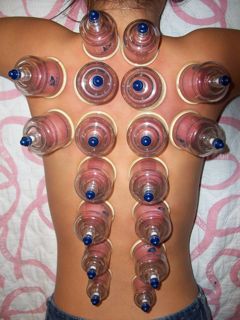Ever since the beginning of middle school, and perhaps even earlier, I’ve suffered from chronic, energy-draining headaches that would sometimes leave me dizzy and light-headed. Even through what seemed like endless bottles of over-the-counter medicines and prescribed medicines, my headaches could not be alleviated. Seeing my struggles, my grandmother suggested that I go see a friend of hers who was an herbalist.
suffered from chronic, energy-draining headaches that would sometimes leave me dizzy and light-headed. Even through what seemed like endless bottles of over-the-counter medicines and prescribed medicines, my headaches could not be alleviated. Seeing my struggles, my grandmother suggested that I go see a friend of hers who was an herbalist.
What I got out of the visit was this: cupping, which is usually described as a procedure in which a rounded glass cup is warmed and placed upside down over an area of the body, creating a suction that holds the cup to the skin. Cupping increases the flow of blood, according to the National Cancer Institute (NCI) and the National Center for Complementary and Alternative Medicine (NCCAM).
Weekly use of cupping didn’t completely rid me of my headaches. I still have minor headaches, but they weren’t and aren’t as high in the pain scale as the ones I used to have. However, cupping wasn’t the only alternative medicine I could have turned to.
Alternative medicines are “practices used instead of standard treatments that generally aren’t recognized by the medical community as standard or conventional medical approaches,” according to the NCI. Such examples are acupuncture, yoga, eating healthy and supplements.
Alternative medicines are now more commonly recognized as complementary and alternative medicine (CAM), “a group of diverse medical and health care systems, practices, and products that are not generally considered part of conventional medicine,” according to NCCAM. Formed by the National Institutes of Health, NCCAM is the “lead agency for scientific research on the diverse medical and health care systems, practices, and products that are not generally considered part of conventional medicine.”
I’m not the only one benefiting from CAM; CAM is becoming a big help in medical fields. For example, researchers at the Oregon Health and Science University reported on October 15th of this year that yoga exercises can help with fibromyalgia.
Nowadays, CAM is being paired up with conventional medicines, according to NCCAM. An example would be pairing Chinese herbs with proven allergy treatments.
The pairing approach was studied by the American College of Allergy, Asthma and Immunology (ACAAI) in Phoenix. From this study allergist William Silvers from ACAAI concluded that “The use of substances found in nature, such as herbs, foods and vitamins, can be helpful in treating various allergies when combined with traditional therapies.” He also said that “it is important that patients consult their allergist before adding [CAMs] to their treatment plan.”
| Related stories: Smartbomb: A Hope for Destroying Cancer Tumors, Dieting for Autism?, Creatine: Safe for Teen Athletes?, Blocking Traumatic Memories |
It is important to ask educated medical professionals when using CAM with and without conventional medicines, say experts. Discovery Health, which is the Discovery TV health channel, says some alternative medicines are put out to the public with misleading information about the product. It also says that not all side effects are known, so some of them could be potentially harmful. Finally, they warn that people sometimes end up relying solely on CAM and stop using conventional medicines, which could cause death. A.J. Park

This work is licensed under a Creative Commons Attribution-NonCommercial-NoDerivs 3.0 Unported License
















Wow! What an interesting article! I have honestly never heard of cupping, but I’m glad it has been beneficial for you.
You did a great job of attributing to multiple credible sources, and also of balancing the article with the Discovery Health point about potentially misleading alternative medicines. Well done!
Wow. This article was amazing. It was so detailed and it gave great examples. I had not ever heard of "cupping" until now. In a way, I sort of understand what AJ is talking about. I have experienced minor headaches such as his/hers. Although they were not as painful as she/he says they were to them. I wasn’t aware of the process of using alternative medicines. I suppose I would at least consider using that option of alternative medicines. I’m sure there is an age limit of course. I’m guessing eighteen or older. Well until then, I’ll just have to do more research!
I’ve never heard of an age restriction/limit for using alternative medicines.
this was a really iteresting topic and I have not heard anout alot of this stuff
I have heard of cuping before and I too have bad headaches most of my day. I have not heard of using cuping for headaches. I was amazsed to hear it worked for you.